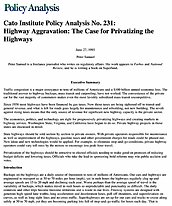Traffic congestion is a major annoyance to tens of millions of Americans and a $100 billion annual economic loss. The traditional answer to highway backups, mass transit and carpooling, have not worked. The convenience of the private car for the vast majority of commuters makes even the most lavishly subsidized mass transit uncompetitive.
Since 1956 most highways have been financed by gas taxes. Now those taxes are being siphoned off to transit and general revenue, and what is left for roads goes largely for maintenance and rebuilding, not new building. The revolt against rising taxes means that the only source of revenue for significant new highway capacity is the private sector.
The economics, politics, and technology are right for progressively privatizing highways and creating markets in highway service. Washington State, Virginia, and California have begun to do so. Private highway projects in those states are discussed in detail.
State highways should be sold section by section to private owners. With private operators responsible for maintenance as well as improvement of the highways, gasoline taxes and other government charges for roads could be phased out. New ideas and new technologies would be applied. For example, to eliminate stop-and-go conditions, private highway operators could vary toll rates by the minute to encourage less peak-hour travel.
Privatization of the highways should be attractive to elected officials needing to make good on promises of reducing budget deficits and lowering taxes. Officials who take the lead in sponsoring bold reforms may win public acclaim and votes.
About the Author

This work is licensed under a Creative Commons Attribution-NonCommercial-ShareAlike 4.0 International License.
